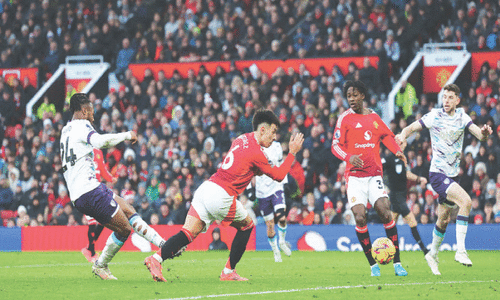RIO DE JANEIRO: At 7am in the morning, a security guard shouts “Levantar se, o tempo de limpeza“ at Rio de Janeiro’s Rodovario Novo, the city’s bus terminal.
On his call, whicht roughly translates into “Get up, its time for cleaning”, hundreds of groggy-eyed football fans are awaken from their slumber.
These fans are here for the World Cup. And they’re sleeping at a makeshift arrangement which is covered in green carpet, has a picture of a football field printed on it and is used for screening of World Cup matches.
Many of them arrived in the night for a match in the morning. They have a ticket for the match but cannot afford a hotel in one of Brazil’s most expensive cities.
“I can’t afford to stay at a hotel,” Mattias, a Chile fan who is planning to travel for their match against the Netherlands in Sao Paulo on Monday, told Dawn.
“Brazil is very expensive,” he adds. “For the last three days [since Chile won against Spain to reach the last-16] I’ve been sleeping here because I cannot stay at a hotel.
“Today, I’ll leave for Sao Paulo by bus … that I have a ticket for.”
It is the Brazil’s vast bus service which most fans are using to shuttle between host cities at the World Cup.
With no rail networks, travelling in the continent-sized country is either by bus or by plane. Travelling by a plane, though, is very expensive.
“If I were to be travelling by a plane, it would rip my budget off,” says England fan Joe Brandsby at Sao Paulo’s Rodovario Tiete on Saturday as he plans to take a bus for Belo Horizonte for England’s final group game against Costa Rica on Tuesday.
England are already out of contention but Brandsby said it was just for the experience that he was going to Belo Horizonte, an 8-hour bus ride from Sao Paulo.
“I’ve been in Sao Paulo for eight days now but the game in Belo would be the first I’ll be watching inside the stadium,” he says. “I want to experience a World Cup match.”
At Rio’s Nova Terminal, Ezequiel Accerboni is returning from Belo on a bus after watching Argentina win 1-0 over Iran on Saturday.
“Today I’m back in Rio but now I’ve not enough cash to stay at a good hotel,” he tells Dawn. “Probably I’ll be looking for a bed/breakfast somewhere here which would be cheap.”
Rising hotel costs and the bus fares which cost around 107 Brazilian Reais ($50) for a one-way trip has meant most fans are running out of cash.
For others, like Russian Ilgizar Malivyiv, they can afford to travel by air.
Malivyiv was in Rio for Russia’s match against Belgium on Sunday and he plans to travel to Porto Alegre and Natal after the game.
“I’ve got my air tickets booked for each destination I’m travelling,” Malivyiv tells Dawn. “Travelling in a bus is very tough and arduous”
Other fans, meanwhile, are looking ahead to the World Cup in Russia in four years’ time.
There, the World Cup organisers have planned free bus and train travel between host cities for fans with match tickets.
“Free travel is a guarantee which we signed at the highest level during our bid,” Alexey Sorokin, head of the organising committee, said last Saturday. “We’ll come up with a very complicated system of using tickets to the game as tickets to a certain means of transportation.”
And when informed about Russia’s plans, Mattias immediately gets excited. “That will be great, that will be amazing.”
Published in Dawn, June 23rd , 2014















































Dear visitor, the comments section is undergoing an overhaul and will return soon.